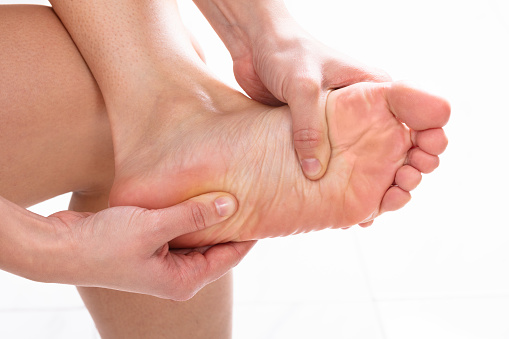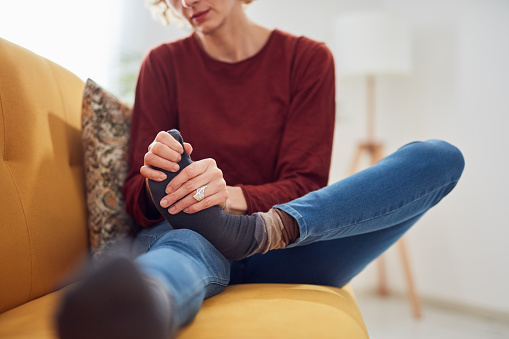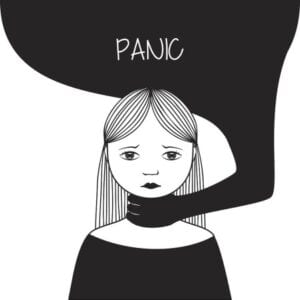
When you have anxiety, it can feel like your whole world is tumbling out from underneath you every time you have to stroll down the street or step out of the house. But can we get anxiety in feet? How common is tingling feet and hands in anxiety?
It can feel like you can’t catch your breath or stand on your own two feet. And that’s because the way your body responds to stress is a lot more than just the anxiety itself—it’s the way you feel throughout your day while you’re experiencing stress.
Anxiety can cause your heart to race, your hands to sweat, and your mind to race—all of which can trigger feelings of stress in other parts of your body as well.
This is because when you feel stressed, your body releases a cascade of hormones and chemical messengers called catecholamines. They’re responsible for the fight-or-flight response that causes your heart to race, your hands to sweat, and your mind to race.
When you’re anxious, these chemical messengers have a negative impact on your body, which can manifest in many different ways. For example, achy muscles and tingling hands are just a couple of the physical side effects you might experience.
Contents
What Is Anxiety in Feet?
Anxiety in the foot is a common problem when having anxiety characterized by numbness, burning, or tingling of the foot. The anxiety in the feet can be a result of hyperventilation or adrenaline which means blood has been moved from the feet. Anxiety increases the risk of hyperventilation which is when a body part takes more blood than it requires bringing in more oxygen and expelling more carbon dioxide than is necessary.
Anxiety is a mental health disorder characterized by feelings of worry, fear, and unease. It primarily affects a person’s thoughts and emotions and can manifest in physical symptoms as well. However, anxiety typically doesn’t specifically target the feet.
That being said, anxiety can sometimes lead to physical symptoms throughout the body. These symptoms may include muscle tension, trembling, restlessness, a racing heart, shortness of breath, and digestive issues. It’s possible for someone experiencing anxiety to feel sensations in their feet due to increased muscle tension or heightened sensitivity, but this is not a direct result of anxiety targeting the feet.
Anxiety in feet can result in foot pain when you begin to walk improperly to alleviate the strange sensation that feels like when your foot falls asleep that is felt in your feet and hands. When your feet are feeling uncomfortable, it’s not uncommon to develop a limp or start walking on the inside of your foot.
The problem is that these walking styles will not only make your feet feel worse, but they can also lead to other health problems like shin splints and knee pain. If you’re experiencing anxiety in your feet, there are some exercises you can do to help relieve the pain.
What Causes Anxiety in Feet?

One possible explanation for sensations of anxiety in the feet is hyperventilation. When a person experiences anxiety, they may start to breathe rapidly or deeply, leading to an imbalance in oxygen and carbon dioxide levels in the body. This can result in symptoms such as tingling, numbness, or a pins-and-needles sensation, which may be felt in the feet. The altered breathing pattern during anxiety can affect blood flow and nerve function, potentially contributing to these sensations.
Another factor that can be linked to anxiety-related sensations in the feet is the release of adrenaline. In moments of anxiety or stress, the body releases adrenaline, a hormone that triggers the “fight-or-flight” response. Adrenaline can increase heart rate, blood pressure, and redirect blood flow to essential organs. This redistribution of blood flow away from the extremities, including the feet, can result in sensations of coldness or tingling.
Hypocalcemia and hypokalemia are also possible causes of anxiety in the feet. It can cause the tingling sensations in the hands and feet associated with people with anxiety. Hypocalcemia is where the blood has too little calcium while hypokalemia means low blood potassium levels. Persistent respiratory alkalosis can lead to these two issues that are a result of an increase in breathing rates.
It’s important to note that these symptoms are typically transient and resolve once the anxiety subsides. If you’re experiencing persistent or concerning symptoms in your feet or any other part of your body, it’s advisable to consult a medical professional for a proper evaluation and diagnosis.
The symptoms of anxiety in feet

There are a number of symptoms that are associated with anxiety in the feet. To describe a few here is a list of symptoms associated with anxiety in the feet, along with their possible causes:
- Tingling, Numbness, or Pins-and-Needles Sensation: These sensations may occur due to hyperventilation, which can lead to changes in oxygen and carbon dioxide levels in the body, affecting nerve function and causing abnormal sensations in the feet.
- Burning Sensation: Increased muscle tension or heightened sensitivity caused by anxiety can result in a burning sensation in the feet.
- Buzzing Feet & Toes: This buzzing or vibrating sensation can be attributed to the body’s stress response, including the release of adrenaline. Adrenaline can affect nerve function and lead to abnormal sensations.
- Cold Feet: During moments of anxiety or stress, the body’s “fight-or-flight” response can cause a redirection of blood flow away from the extremities, leading to cold feet.
- Foot Pain in the long run: Chronic anxiety and stress can contribute to muscle tension and inflammation in the body, including the feet. Over time, this can lead to foot pain and discomfort.
- Feeling Weak: Anxiety can cause the body to release stress hormones, such as adrenaline, which can lead to muscle weakness or a feeling of weakness in the feet.
To treat these symptoms, one person needs to take care of themselves by recognizing what’s causing the feelings and treating them accordingly. It’s important that individuals remember that stress and anxiety are not always easy to deal with but there are ways you can reduce your stress if possible.
Can anxiety make your feet feel numb?
Anxiety can cause numbness in the feet due to blood vessel constriction reducing blood flow to the feet and other extremities, hyperventilation or adrenaline, or a poor diet.
In one article, the following conditions may be related to foot numbness:
- Blood vessel constriction reduces blood flow to the feet and other extremities
- Hyperventilation or adrenaline
- Poor nutritional state (low iron levels)
- Smoking
- Excessive alcohol intake
- Lack of exercise-induced vasodilation
- Diabetes
- Peripheral neuropathy
- Raynaud’s syndrome
- Stroke
Can anxiety cause feet to tingle?
People who experience anxiety may hyperventilate, which can cause tingling in the feet or hands. This is due to increased blood flow and a release of endorphins during periods of intense stress.
When someone with high anxiety levels hyperventilates, their body will go into “fight or flight” mode, releasing adrenaline that quickly prepares it for action. Hyperventilation can also cause people to feel lightheaded and dizzy as CO2 levels drop in the bloodstream and the brain starts to get oxygen-starved.
In order to compensate for this lack of oxygen, the body will increase its heart rate and breathing patterns, which can lead to tingling sensations in the hands or feet. The feeling of tingling is not a sign of injury- it’s a natural response to low levels of CO2 in the body.
Can anxiety make your feet cold?
Yes, anxiety can cause cold feet especially when you are always in a state of anxiety or high stress. And that’s not a good thing. Cold feet can indicate a variety of health problems, such as frostbite (especially in the winter), circulation problems, and more.
Cold feet may also be a sign of anxiety. Anxiety has many different signs and symptoms, some of which can manifest themselves in the feet. These symptoms include cold feet, tingling toes and hands, restless legs, and more. The cause of these sensations is usually an overactive sympathetic nervous system.
While it’s normal to have occasional feelings of anxiety, when someone is experiencing these symptoms constantly they may need to seek professional help or speak to their doctor about possible medical conditions that could be causing them.
If you experience any of these symptoms on a regular basis, it is worth your time to explore the cause and consult with your doctor or healthcare provider if necessary.
Can anxiety cause weird feelings in feet?
It is common for anxiety to cause feelings of numbness and tingling in the feet and hands. There are many different ways anxiety can manifest itself in the body, and it is not surprising that people with high anxiety may feel sensations in their feet.
The most common sensation those with high anxiety feel is a tingling or numb feeling in their toes or fingers. This is often accompanied by an uncomfortable feeling of pins and needles. This can be caused by the constant stress of worrying or trying to keep tabs on everything happening around them.
Another common cause of numbness and tingling in the feet is poor blood circulation. It is common for those who experience anxiety to have higher levels of stress hormones, which can restrict blood flow to the legs and feet.
If you are experiencing these symptoms, it’s important to speak with a doctor or therapist about how to manage your anxiety levels. While this article cannot offer professional medical advice, there are several tips offered as general guidance for managing feelings of tingling in your feet from anxiety.
Why does anxiety in feet occur?
The symptoms of hyperventilation are tingling feet and hands, dizziness, muscle cramps, chest pain, feeling lightheaded, and a sense of panic. If you’ve ever hyperventilated for too long, you might have noticed your feet starting to feel tingly and that your fingers are numb.
Hyperventilation is often caused by anxiety. When people get stressed out or anxious, they breathe heavier than usual. Breathing at this pace means that less oxygen is being taken in as the body breathes out more carbon dioxide in a shorter span of time. This causes the person to feel lightheaded which can lead to other symptoms such as tingling feet and hands.
Another possible cause of anxiety in the feet is peripheral neuropathy which can be caused by diabetes or alcohol-related nerve damage. Neuropathy refers to any disease of the nerves including their roots or branches that’s why it’s called peripheral neuropathy. Symptoms include numbness or weakness in the feet or hands which could also lead to a person experiencing tingling feelings like those experienced from high anxiety!
Overcoming Anxiety in Feet with Self Care
One of the most common causes of anxiety is a sensitivity to stress and pressure. This article explores the possible causes of anxiety in feet and how to treat it. If someone has high anxiety, they may feel as though their lives are under constant scrutiny and always have to be on the lookout for something negative.
Their feelings of being watched and criticized by others may cause them to feel stuck, trapped, and as if they have no control over their lives. For those with high anxiety, their feelings of being watched often manifests itself on their feet.
One way to reduce these feelings is through self-care activities such as:
- Breathing exercises,
- Getting up and moving your body,
- Doing something that relaxes you (e.g., foot massage),
- or simply planting your feet evenly and widely apart so you can take a deep breath.
- Above all else, remember that this feeling will go away. Anxiety may not go away overnight, but after following the methods in this article, it will start to subside over time.
- Changes in the diet to something healthier and well-balanced.
Moreover, Yoga and meditation are the other management methods that you can consider for your anxiety.
How do you relax your foot muscles?
One of the most common causes of tingling feet and hands is anxiety. When people suffer from high levels of anxiety, they may feel as though every move they make is being watched. This feeling of being watched often manifests in their feet and can lead to tingling.
There are many ways to combat this issue that causes anxiety in feet, but there are a few key things you should try. For example, you can draw a foot bath at night with Epsom salts to relax your muscles and relieve the tension in your body.
You could also try doing some stretches when you wake up in the morning, practicing strengthening exercises throughout your day, getting a foot massage from time to time, buying arch supports for your shoes, or switching them out for another pair if you think it might help, icing your feet for 15 minutes before bed or taking a pain reliever like ibuprofen.

Anxiety in Feet Treatment
The anxiety in feet treatment depends on what is causing the anxiety. If tingling feet and hands are only a symptom of another condition, then treatment for that condition will be the best way to manage it. If tingling feet and hands are caused by stress, anxiety, or other factors, then there are some foot-based treatments that can help.
For example, reflexology is an alternate form of therapy that claims to release blockages in the body by massaging specific areas on the foot. Reflexology can also help calm nerves and provide relief from general feelings of stress or pressure.
Foot massage is another anxiety alternative therapy that can provide similar benefits when treating anxiety in feet as long as they’re done regularly so they have time to take effect. It’s important to note that it’s not just anxiety related to stress which may cause tingling in your feet – poor circulation may also lead to this feeling.
If you experience this symptom with no other symptoms of high anxiety or prolonged periods of high stress, see your doctor to see if there is something else going on with your body.
The physical symptoms alone don’t mean you have severe forms of anxiety, but it does warrant a visit to your doctor so you don’t miss out on any more serious health issues.
The most common cause of tingling in the feet and hands is usually due to poor circulation which can be treated by wearing compression socks (which increase blood flow) or getting more exercise throughout the body.
Why do I feel anxiety in my feet?
There are many reasons why you may feel anxiety in your feet. One is your body releases stress hormones when anxious that make your blood pump through your veins faster, your heart rate increase, and your muscles tense.
This can cause your body to feel tense in general, but more specifically it can cause your feet and hands to tingle. This tingly or weak feeling in the feet is sometimes referred to as “anxiety in feet.” You’re more likely to notice this sensation because you stand still most of the day and don’t use the muscles in your legs as much.
Many people with anxiety also have a hard time sleeping due to the fact that they are always thinking about their worries. Not surprisingly, this lack of sleep can make some people feel anxious or nervous when they wake up and their feet tingle.
The other many reasons why you may feel anxiety in your feet, but the most common are stress, anxiety, and sometimes insomnia. All three of these issues can be treated through medication and therapy.
When someone stands on their feet for an extended period of time, like a doctor or nurse, they may experience this sensation since they’re constantly on their feet and trying to keep themselves from being anxious about what’s going on around them.
Do feet hold stress?
Yes, the feet are among the most common areas that we tend to hold stress which also include the neck, shoulders, hips, and hands. Feet are often targets for anxiety as well. Feet may feel tingly, itchy, or have a dull ache. There are several reasons why feet may be experiencing these sensations and they’re not all related to anxiety.
The most common causes of tingling feet and feet that itch are an allergic reaction, like an allergy to wool, or an autoimmune disorder like eczema. Another common cause of this sensation is a lack of circulation in the legs which can lead to feelings of numbness in the toes or feeling pins and needles.
A blood clot can also cause pins and needles in the legs from sitting for long periods at one time. Anxiety can also cause these symptoms in the feet. Anxiety is often linked to stress so if someone has high levels of stress in their life, they may feel anxious throughout their day.
When someone experiences anxiety, their body releases a chemical called cortisol. This chemical can even make chronic pain worse because it increases inflammation in the body which then triggers more pain signals to go up to our brain.
The release of cortisol also makes us sensitive to any discomfort we might feel with prolonged periods of sitting or standing which could cause people to become overly anxious about feeling their feet tingle or itch.
There are many possible causes for tingling feet and it’s important to get them checked out by your doctor if you start noticing these sensations regularly.
How long can anxiety-tingling last?
When it comes to anxiety, it’s difficult to determine the duration of its tingling symptoms. Some people experience numbness and tingling in their hands and feet for up to 20–30 minutes, while others might experience it for hours.
This is a result of the individual’s own body chemistry and how they specifically react to stress. In general, this is a sign that someone has high levels of anxiety; it doesn’t last forever but can come and go as needed.
The most important thing is recognizing the signs of anxiety and knowing what you can do about it. In many cases, people with high levels of anxiety are left feeling helpless because they don’t know how to control their feelings.
It may be possible to find ways to help yourself feel less anxious and more in control over your life, such as by practicing mindfulness or finding new activities that bring you joy.
Does anxiety cause poor circulation?
Yes, anxiety can cause poor blood circulation. This is because it causes constriction of blood vessels, hyperventilation, and changes in heart rate all of which affect the blood circulation throughout the body.
High anxiety can cause a person to experience tingling in their feet and hands, as well as numbness. If someone experiences anxiety in their feet, it’s likely that the anxiety is stemming from something else. It could stem from an undiagnosed health condition or even an addiction to drugs or alcohol.
Anxiety in your feet is often a sign of poor circulation throughout the body, and it’s important for those experiencing this symptom to seek medical attention. Often times when people are feeling anxious, they’ll experience tingling in their hands and feet as well as numbness.
This is because high levels of anxiety can cause changes to the heart rate and blood flow throughout the body. It’s not uncommon for people who suffer from high levels of anxiety to also experience chest pain and shortness of breath, which may lead them to believe they are having a heart attack or another serious medical emergency.
The best way to know if you’re suffering from anxiety is by speaking with a doctor about your symptoms and asking for help so that you can find relief before any more damage can be done.
Conclusion
Anxiety in feet is a common condition that can be very debilitating. There are many possible causes of anxiety in the feet and it’s important to determine which one applies to you before you seek treatment.
Thankfully, there are many treatments available for different causes of anxiety in the feet. Explore the different options available to find the best treatment for your anxiety in your feet.
The most common areas in which we hold stress are the neck, shoulders, hips, hands, and feet. It might be helpful to explore these areas to identify when and where you feel the most discomfort. You can then start to develop strategies to release the tension in these areas.
It’s important to remember that your feet can tell a lot about how you’re feeling—numbness or tingling in your feet could be a sign of anxiety. The most common causes of this symptom are cold feet or changes in blood flow due to hyperventilation or adrenaline.
Remember that many of the symptoms of anxiety can last for up to 30 minutes so it’s important to try and relax if you feel your feet tingling or going numb.
One way to relax your foot muscles is by drawing a foot bath, doing some stretches, practicing strengthening exercises, getting a foot massage, buying arch supports, switching your shoes, icing your feet, or taking a pain reliever.
FAQs
What is the difference between stress and anxiety?
Anxiety is an irrational fear of a situation or event that cannot be controlled, while stress is a physical reaction to an external factor. This can include a change in environment, like moving to a new city or starting at a new school.
What causes anxiety in feet?
Anxiety manifests itself in different ways for different people. For those with high anxiety levels, anxiety often manifests as tingling in their feet. This is due to the constant state of worry they are constantly living in. Anxiety is often rooted in some other feeling and once it’s treated, the tingling will stop.
How can you treat anxiety?
There are several methods for treating high levels of anxiety. One way to combat it is through therapy sessions that focus on addressing the source of your anxiety and teaching you coping mechanisms for when symptoms begin to surface again. Another way to treat it is through medication which also helps address the source of your anxieties and may have less side effects than therapy sessions alone
